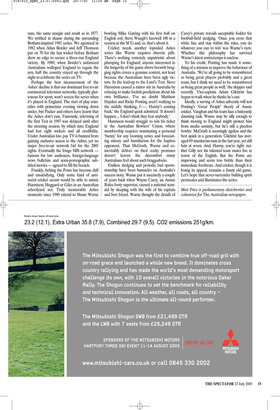Why Aussies are rooting for the Poms
Matt Price says that many down under would like to see the boorish and bragging home team take a thrashing in the Test series Sydney First, a macabre coincidence. The last Ashes series, the eighth straight pitiful England capitulation, started days after the Bali bombing which killed 88 Australians and 26 British travellers. Now, as the Lord’s Test begins, London reels from the atrocious targeting of morning commuters.
The recent bombings have evoked enormous and deserved admiration for stoical Londoners. Down in the convict colony, headline writers and cartoonists have utterly exhausted the clichés depicting ye-olde-Dartnever-surrender-stiff-upper-lipped-Britishbulldog spirit. Still, as cricketing hostilities resume, you’d think there’d be scant room for sentiment. Australians, you’d reckon, would be rooting for Ricky Ponting’s world beaters to humiliate the Poms over the coming months. And you’d be dead wrong. Many of us, I’d argue a comfortable majority, pray that the current Test series is close. Of that bunch, a significant minority indulges in the probably vain hope that Michael Vaughan’s side can conjure a preposterous victory.
Prime Minister John Howard is merely the most prominent Aussie hoping that England scares the creams off the tourists. ‘It’s silly to pretend it’s good for things to be so onesided,’ Mr Howard told Wisden Australia. ‘It’s good for it to be close, everybody likes a bit of competition.’ The PM isn’t an idiot; he hopes Australia retains the Ashes. But the unstated logic of Mr Howard’s sentiments is undeniable; our four-time election winner and selfconfessed cricket ‘tragic’ won’t be unhappy if Australia loses a brace of matches. With respect, PM, I’ll take those two Tests and raise you a series-clinching one. An England victory would be terrific for two reasons — competition and comeuppance.
Nostalgia makes mugs of all of us. In truth, practically every sport is better off now than it’s ever been. Cricket, especially Ashes cricket, is patently worse. I grew up in Perth, the most isolated city on earth. Countless nights were spent drifting to sleep listening to John Arlott, Brian Johnston and other BBC luminaries cheerfully broadcasting from romantic places such as Lord’s and Headingley. The first TV coverage of an Ashes Test to Australia featured the West Australian local hero Rod Marsh batting with Paul Sheahan to square the 1972 series. This remains a vivid memory three decades on, along with Dennis Lillee’s England debut and Bob Massie, another Perth boy, snaring 16 wickets at Lord’s.
Through the 1970s and 1980s Ashes cricket was important and captivating. It survived Kerry Packer’s World Series Cricket and rogue South African tours. England players were household names in Australia; every cricket-mad schoolkid in the land could impersonate the distinctive bowling actions of Bob Willis and Ian Botham, and more than a few of us stretched the repertoire to include cameos of Graham Dilley, Mike Hendrick, John Emburey, Fred Titmus and Derek Underwood. Most Australians can remember where they were in 1977 when Greg Chappell’s team won the Centenary Test by 45 runs, the same margin and result as in 1877. We writhed in shame during the astounding Botham-inspired 1981 series. We agonised in 1982 when Allan Border and Jeff Thomson put on 70 for the last wicket before Botham drew an edge to secure a three-run England victory. By 1989, when Border’s unfancied Australians walloped England to regain the urn, half the country stayed up through the night to celebrate the series on TV.
Perhaps the best measurement of the Ashes’ decline is that our dominant free-to-air commercial television networks, typically gluttonous for sport, won’t screen the series when it’s played in England. The start of play coincides with primetime evening viewing down under, but Packer and others have learnt that the Ashes don’t rate. Famously, televising of the first Test in 1997 was delayed until after the morning session, by which time England had lost eight wickets and all credibility. Under Australian law, pay TV is banned from gaining exclusive access to the Ashes, yet no major free-to-air network bid for the 2005 rights. Eventually the fringe SBS network famous for low audiences, foreign-language news bulletins and semi-pornographic subtitled movies — agreed to fill the breach.
Frankly, belting the Poms has become dull and unsatisfying. Only some kind of antisocial cricket savant would be able to mimic Harmison, Hoggard or Giles in an Australian schoolyard net. Truly memorable Ashes moments since 1989 extend to Shane Warne bowling Mike Gatting with his first ball on English soil, Steve Waugh’s farewell 100 in a session at the SCG and, er, that’s about it.
Cricket needs another lopsided Ashes series like Warne requires diuretic pills. There’s nothing remotely unpatriotic about plumping for England; anyone interested in the longevity of the game above boorish bragging rights craves a genuine contest, not least because the Australians have been ugly victors. In the lead-up to the Lord’s Test, Steve Harmison caused a minor stir in Australia by refusing to make foolish predictions about his own brilliance. ‘I’ve no doubt Matthew Hayden and Ricky Ponting aren’t walking to the middle thinking, f—–, Harmy’s coming back,’ the England quick admitted. ‘It doesn’t happen.... I don’t think they fear anybody.’ Harmison would struggle to win his ticket in the Australian Bowlers’ Union, where membership requires nominating a personal ‘bunny’ for any looming series and forecasting misery and humiliation for the hapless opponent. That McGrath, Warne and co. inevitably deliver on their cocky promises doesn’t leaven the discomfort many Australians feel about such braggadocio.
Endless sledging and periodic bad sportsmanship have been barnacles on Australia’s success story. Warne put it succinctly a couple of years back when Wayne Carey, an Aussie Rules footy superstar, caused a national scandal by sleeping with the wife of his captain and best friend. Warne thought the details of Carey’s private travails acceptable fodder for football-field sledging. ‘Once you cross that white line and stay within the rules, you do whatever you can to win’ was Warne’s view. Whether this philosophy has survived Warne’s latest contretemps is unclear.
To his credit, Ponting has made it something of a mission to improve the behaviour of Australia. ‘We’re all going to be remembered as being great players probably and a great team, but I think we need to be remembered as being great people as well,’ the skipper said recently. Vice-captain Adam Gilchrist has begun to walk when he thinks he’s out.
Ideally, a serving of Ashes adversity will test Ponting’s ‘Great People’ theory of Aussie cricket. Vaughan and his team face a hideously daunting task. Warne may be silly enough to think moving to England might protect him from media scrutiny, but he’s still a peerless bowler. McGrath is seemingly ageless and the best quick in a generation. Gilchrist has averaged 69 murderous runs in the last year, yet still bats at seven. And, Harmy, you’re right: neither Gilly nor his talented team mates live in terror of the English. But the Poms are improving and seem less brittle than their immediate forebears. And cricket, though it is losing its appeal, remains a funny old game. Let’s hope that never-surrender bulldog spirit permeates and illuminates the series.
















































 Previous page
Previous page